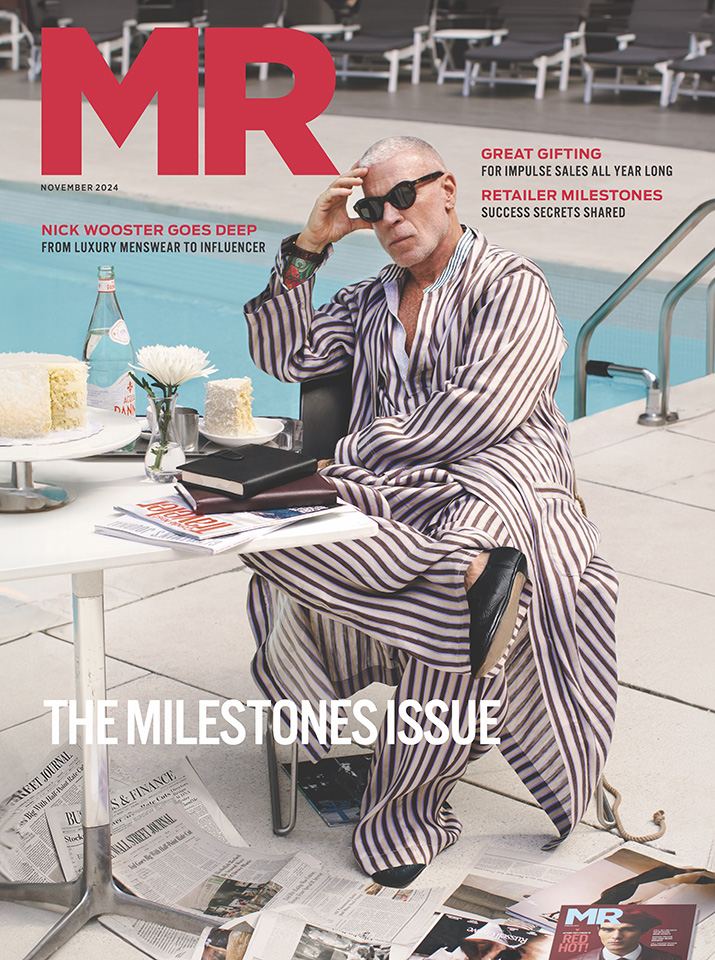Speaking with style: John Miln, CEO of UKFT

For all of the hype around a renaissance in British clothing and textile manufacturing, John Miln, CEO of the UK Fashion and Textile Association (UKFT), believes for the most part that it’s just talk. He spoke to Petah Marian about the state of the UK manufacturing sector and some of the initiatives being undertaken by the industry body.
Over the past year, UK high street retailers like Topshop, George at Asda, and John Lewis have all begun talking about ramping up their local sourcing. Yet for Miln, who heads the UK trade body for the fashion and textile industrylarge scale manufacturing for volume retailers is something that is unlikely to return to these shores.
However, while the industry is unlikely to return to the highs of 20 years ago, he points out that there remain a number of “very successful” companies applying their skills in the medium-to-better end of the sector and in niche categories.
Manufacturers like Manchester-based Cooper & Stollbrand are working “the volume area as far as they’re able, but that’s very difficult given the UK high street’s desire to outsource volume apparel production to lower labour cost countries”.
There is also a place for brands with a significant history or heritage. “If you’re Barbour producing jackets in North Shields, if you’re Mulberry producing handbags in Somerset, Dents making beautiful gloves, or silk in Sudbury and Suffolk, if you’re making woolens in Yorkshire, or if you’re making a cashmere sweater in Scotland,” he says, highlighting a number of success stories.
“The Shetland knitwear boys, they’re sold out for 18 months, but in a very small capacity.”
Yet, while these pockets of expertise do remain, they are a shadow of their former selves. “All you have to do is go to Hawick in Scotland, where there were 20 factories, these days there is half a dozen. Each part has suffered equally, hit by the flight offshore”.
Skilled staff
One of the main issues preventing an expansion of UK manufacturing is finding skilled staff.
“There isn’t any factory, aside from Barbour, Mulberry and Johnston’s of Elgin that can pay more than the minimum hourly wage. So where is the attractiveness of working in a factory when you can get more money working in a call centre?” questions Miln.
“The dynamics of the culture have changed, working in a factory 25 years ago was quite normal. In 2012, we’re not so much a nation of manufacturers, by comparison to yesteryear.”
As part of efforts to boost the workforce, the UKFT is working with government body Creative Skillset to help manufacturers gain access to funding for training. The industry body has been working to develop clusters so that manufacturers can pool their resources to secure like-for-like funding from the government.
Impact of deflation
While the high cost of labour has priced UK-made products out of much of the high street, deflation has also had a major impact. “Price deflation in apparel is humongous, even if people put their prices up, we’re nowhere near price parity,” says Miln.
He makes the point that a shirt costing GBP35 in 1990 can still be bought for the same price today, even though in real terms it should have increased to around GBP80-90. “So this shirt has to go up in price by 60 quid before it’s the same price as 1990.”
A return to volume manufacturing
Despite all the speculation over the past year, there is no evidence to suggest there is going to be a return to the glory days of UK manufacturing.
“I think there’s a generally accepted view that volume manufacturing will not come back, but niche can be broadened into higher-end mainstream. I think that’s an easier way than us going out to build a huge big factory where we’re going to make 1m quids-worth of knickers. We try to convey that message, and support it wherever we possibly can, and to create the opportunities.”
But there is growth…
And there are opportunites. Miln says the recent spate of conferences promoting UK manufacturing gives already-established manufacturers opportunities to grow, rather than opportunities for opening large factories from scratch.
“It’s for manufacturers to say, can I build an extra 20,000 square feet in my factory, can I employ the people because there is the opportunity. For those guys I think the answer is yes, there is an opportunity to grow.”
Growth is happening, emphasises Miln, “but it’s not happening wholesale in a way that anyone would understand. There’s 150 little factories around London, but they’re all one or two people and one machine, but it’s technically happening”.
While what has been thought of as a sea change has really only been a trickle so far, the UKFT is very aware of the changing dynamics in the sourcing sector.
Rising costs and a need for faster turnaround times means that more companies are looking to consider alternative markets to the Far East, and the industry body is keen for the sector to grasp any opportunities that may come up.
“When dynamics change, opportunities exist. If fortune favours the brave, and an opportunity exists, why are we not going to go out and grab it?”
And for all of that excitement, Miln is keen to impress upon the sector that for manufacturers to extend or open new factory space, there needs to be a long-term commitment from retailers and brands to support local manufacturers.
“If there’s a relationship that a manufacturer can build with a retail base, with commitment there will be ongoing business, then people might want to invest to build capacity,” says Miln.
Revitalising the UKFT
The industry body has also spent a lot of time this year revitalising the organisation, following a “sea change in governance”. Miln says a key component of this is working towards “one industry, one voice”.
To that end, UKFT is working to lobby the government, setting up an all-party group of MPs to promote what it is doing, and launched a manifesto in May that seeks a level playing field with Europe and the rest of the world. It also wants a commitment to make it easier for UK companies to bid for UK contracts, as well as support to deliver training and an increased role in promoting exports.
As the largest Accredited Trade Organisation (ATO) by number of companies it takes abroad, export is a major part of the UKFT’s day-to-day activities. Each year the UKFT takes “well over” 500 new companies to export, largely by supporting them at international exhibitions.
‘Made in the UK’ has great cachet, but is something foreign buyers place more value on than UK companies. “The successful companies are good at export – because their product is very much in demand.”
The past year has also seen the UKFT work to become a “modern, relevant and contemporary” organisation to best serve the broadest spectrum of its membership. The group is working on its website, expanding its marketing team and upgrading its PR requirement, to “shine a light” on all the issues of concern.
The last year has also seen the launch of UKFT Rise, a networking event that brings together retailers and manufacturers in the earlier stages of their careers – and which Miln believes is a “hugely important initiative that will create the leaders of tomorrow”.

